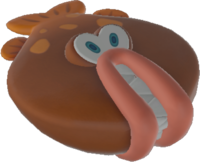Smackerel: Difference between revisions
No edit summary |
|||
| Line 1: | Line 1: | ||
{{new subject}} | {{new subject}} | ||
{{distinguish|[[Snackeral]]}} | |||
{{species infobox | {{species infobox | ||
|image=[[File:Smackerel model SMBW.png|200px]] | |image=[[File:Smackerel model SMBW.png|200px]] | ||
Revision as of 20:13, October 31, 2023
This article is about a subject in an upcoming or recently released game. When the game is released, or more information about this subject is found, this article may need major rewriting.
This notice should be removed after a month has passed since the game was first released.
- Not to be confused with Snackeral.
| Smackerel | |
|---|---|

| |
| First appearance | Super Mario Bros. Wonder (2023) |
Smackerels are enemies that appear in Super Mario Bros. Wonder. They resemble flounders, being flat fish enemies with both eyes on the same side of their body, albeit with large, sharp-toothed jaws. Smackerels solely appear in the level Leaping Smackerel, where they burrow through the sand, periodically jumping out vertically to attack the player character. During the Wonder Effect of the level, a giant Smackerel appears, which is able to bite through part of the level to help the player collect Wonder Tokens.
Their name is a portmanteau of "smack" and "mackerel".
Names in other languages
| Language | Name | Meaning | Notes |
|---|---|---|---|
| Japanese | ハイデン[?] Haiden |
Possibly from Chinese word「海底」(hǎidǐ, sea-bed) and「デーン」(dēn, an onomatopoeia used to represent something dramatic happening) | |
| Chinese | 海蹬[?] Hǎidēng |
Transliteration of the Japanese name | |
| French | Limange[?] | Portmanteau of "limande" (dab) and "manger" (to eat) | |
| German | Sandhechte[?] | Sand pickerel | |
| Italian | Sfondalone[?] | Portmanteau of "sfondare" (to break through) and possibly "pesciolone" (big fish) | |
| Korean | 넙쩍이[?] Neobjjeok'i |
From "넙쩍" (neobjjeok, flat) and the nominalizing suffix "~이" (-i) | |
| Portuguese (NOA) | Linguiado[?] | From "linguado" (flounder) and "guiado" (guided) | |
| Portuguese (NOE) | Perseguiçolha[?] | Portmanteau of "perseguir" (to pursue) and "solha" (flatfish) | |
| Spanish | Soterraballo[?] | From "soterraba", a conjugation of "soterrar" (to bury) |